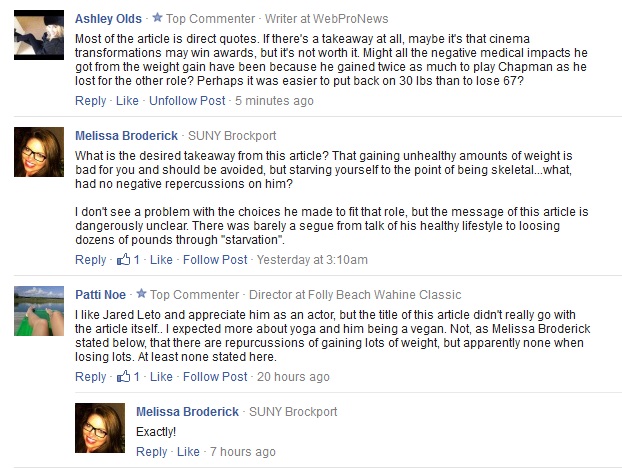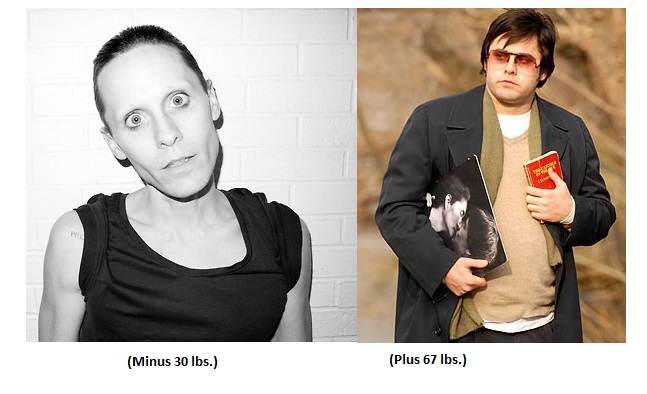
For your brain, heart, body and soul…

For your brain, heart, body and soul…
Dr. Andrew Weil is well-known for his efforts to bring integrative medicine to the mainstream, which combines the best of new Western technologies with traditional Eastern medicine.
Recently, Dr. Weil was asked about kombucha, which is rapidly gaining popularity in the West and is well-known in Russia and the Far East as a popular health beverage.
Dr. Weil warns of aspergillus, a toxic fungus that can be produced by home-brewing kombucha improperly, and that it can have deadly results for the elderly, children, or pregnant or nursing mothers.
But the real second-half of the one-two punch came with Dr. Weil’s final statement: “I know of no health benefits to be gained by drinking kombucha tea”.
What do you think? Is Dr. Weil giving kombucha a fair rap?

I was reading this thing this morning about Jared Leto doing yoga before heading off to a class myself.
The article was about how his yoga and diet have kept him young, how it’s changed his view on drastically altering weight for roles, etc. It included links about the disparities in poundage, and mostly included the actor’s actual ruminations about his roles, diet, life (versus author opinion).
You can read the actual article yourself, but here’s my watered-down-from-what-I-wanted-to-say comment:

Yeah. I stand by this.
When a story is made up namely of quotes, it’s hard to call it biased. The author even included a link so that readers could see the details about the actor’s other weight transformation. They didn’t make up those medical infirmities Mr. Leto realized after packing on pizza pounds. The tranny transformation chopped off about 30 lbs – he went from his usual 146 lbs down to 116 lbs.
But for the role of Chapman double-chin, it was double that.
He surfed through snack foods and grease until he’d gained 67 lbs, saying, “I just ate giant pizzas and everything you know you’re not supposed to eat. That’s what you eat to gain weight like that. If you’re a young actor reading this, you should never do that.”
Sure, it wasn’t the longest article. I get what the commenters are saying – yoga is about equanimity. But in this case, the yo-yo extremes weren’t equal and we only have Mr. Leto’s quotes to go on. Could they have added an “extreme weight loss is just as bad” bit with a snappy of Christian Bale in the Machinist? Yeah. Sure. But not every author wants (or is allowed) to inject their own opinion into their articles.
As a writer, I know how hard it can be to try and tell a story in an ethical light, telling some universal truth, without either sounding biased or coming off like a soap box douche nozzle:

It’s not the author’s fault that Leto landed ambulatory foot pain from playing a fatso. Homeboy had to roll around in a wheelchair because of that and took a year to bring back some semblance of normalcy.
Now that’s fodder for some real mental nomming.
Let’s go back to the main point of the article: Jared looks radiant (not just Hollywood young and hot and great for his age – but like that whole glowy thing hardcore yogis have).
For him – a dude whose baseline is balanced and healthy – it took a whole year to get back to that default setting.
Fat, skinny fat, whatever – for people who’ve been punishing themselves with diet extremes their whole life (like I have), imagine how much longer that’d take? If you’re patient, it’s eventually totally worth it.
In the meantime, do some hippie stretches (actually it’s an eleventy-billion year old practice from a faraway majestic land – but let’s not get technical), get the eff outside, and maybe occasionally let the old ipod be a zero-headphones, full blast, “nature shuffle” surround-sound experience.
Says I, from my couch, cursing the cold.
And for my controversial super-biased takeaway message: nunna these’re good:

And stop complaining about an author’s writing. People complain when it’s biased. People complain when it’s nothing but quotes. The internet is vast – look up the rest of the story if you doubt what you’re reading (which you always should – read with a critical eye, that is). And if you don’t trust any of it, close your eyes, drown out distractions, and find rurrrl truth.
Can’t show you what that’s like. Just hafta find out yourself.
I love you all like Karen Carpenter loved her ego-finger after lunch.
“I imagine Hollywood has an underground Fogo de Chao that publicly vegan celebrities secretly sneak into. Much like an opium den, it’s filled with smoke and passed out patrons – except the smoke rises off the ceaseless meat offerings, while everyone’s passed out from eating too much of it.”
-ThisBitch, TheFaceBookFiles
I joke, but really.
They’re just human people. If they say they’re vegan – they mean right now. That could change a year from now when they’ve gone batty during Valium withdrawal and shaved their head with a lawnmower. I mean, I’m not static. I’m a different human, daily. Somedays I’m productive and feel great. Some days, I feel like I got hewn apart and haphazardly sewn back together in my sleep. I loathed Lady Gaga’s music for years. Then “Applause” came out and I had to hide my newfound habit. Madonna was American. And then, one day, she was British.
We change over time – and the same can go for diets – regardless of who you are. I haven’t eaten meat in a really long time. Like – three years maybe?I dunno, honestly. I don’t identify with a dietary group that holds meat-ings or gets clean carnivore coins or keytags for it. Not here in Northern Virginia, at least.
Out in L.A., though, I’d almost be surprised if they didn’t. Out there, anyone will ask what feeding genre you fall into – from the nice folk making small talk at a restaurant – to the room service dude who brought me my fruit platter promptly at noon every day I was there.
What’s this obsession with what goes in our tummies? (and if you live in San Fernando Valley, that means something else, totally.) As someone who’s struggled with the highs and lows of food obsessions myself, I think I get it. Like, out west (in that region, at least), people are ceaselessly surrounded by slim framed celebrities discussing which sorts of fuel they prefer to turn into feces. And then there’s the element of celeb wannabes with the delusion that they’ll occupy that same glittering group in rank and air if they take sufficient lifestyle notes and match shits with them.
Then, there’s yet a third group: those whose aspirations aren’t wrought from a desire to attain some elevated status, but because they just want to be in on the spectacle.
I identify with all’a that crap. Once upon a time, I lived there a year or so myself. We could go on a spiritual tangent saying it’s all irrelevant – whether you’re acclimating for social adoption, or matching diets and de la Renta with the next chick. I could say how all three’ll get sucked down the same unaddressed void at equal velocity – and leave you ravenous for more.
But that’s a dead horse whose meat I won’t eat (do we eat horse meat?) and here’s why.
Actually, my initial incentives were totally vain. I just wanted to be hot and thin with amazing skin and mermaid hair. Then, somewhere along the way, my svelte-status motives started changing (mostly because the end goal wasn’t coming so I had to switch gears) and realigning with this annoying thing that started nagging at me (I’m told it’s the beginnings of conscience. I’ll need more proof prior to believing such conjecture).

It wasn’t that hard, quitting meat. Really, I had more trouble with cheese (took a year), still haven’t quit cream products (no, the cow pus thing still doesn’t register for me), and I’ll never give up my teatime bee spit (honey).
So, when I get that raised eyebrow from someone silently judging me while asking, “So, why won’t you eat meat when you eat animal byproducts? ” (the inspiration for this whole entry and the idea being that creatures still suffer as their fluids are being siphoned out for human consumption), I try not to judge them for judging me. They’re just sad inside and stuff – and prodding at people with an emotional poker fills it for a bit, I guess. Once I transcend my self-conscious resentments ‘bout it, I try to let them know that – yeah – I’m not perfect.
And I don’t have a current gastronomical grouping.
But what I feel is basically this:
If something can think the thought, “Ow! Fcuk! I’m dying!” on the way to my dinner plate then, like, I kinda don’t want it.
For now, at least.
#Imonaspiritualpathbetch
Headaches are not just endemic to the Western world.
This video shows a traditional African headache memory that’s mindboggling.
It requires an unidentified leafy branch, ashes, and chanting.
https://www.youtube.com/watch?v=fuyinSJSHes
No word if it works, but when you have a headache—it may seem like ANYthing is worth a try.

One of the unusual things about kombucha is the fact that it’s fermented. Outside of sauerkraut or pickles, it’s hard to imagine many foods in a modern diet that are fermented.
We haven’t needed to ferment foods since the advent of refrigeration, which has changed diets and changed tastes. However, it’s a part of our food history that’s little-recognized:
every long-lived culture in the world consumed fermented vegetables, dairy and meat. Fermentation reaches back six thousand years into Chinese culture, the Aboriginal peoples of Australia buried sweet potatoes, and ancient Roman manuscripts describe lacto-fermented sauerkraut.
But does it still have a place in the modern world? Are there any health benefits from fermentation?
According to Jordan Rubin, author of The Maker’s Diet, “[f]ermentation is especially effective in releasing important nutritional compounds through “pre-digestion” that would otherwise pass through the human digestive system, undigested and unused.” It seems that, by expunging fermented foods from our diet, we’re not getting the most out of our foods as we should.
Luckily, however, we have kombucha, probably the easiest to consume modern fermented product—and one you can make yourself.

When you think of an “apothecary”, you think of an old-time store with an enchanting owner and myriad glass bottles of cures.
But now we’re “in an age where Walgreens and CVS rule every corner,” so why are apothecaries coming back into fashion?
All the Nyquil and modern cures in the world just can’t match the old-time remedies:
Natural remedies for flu symptom and cold symptoms share their own display near the register towards the back of the store. Winter says the flu-like symptom remedies are some of the best sellers.
Also, this generation is taking a greater interest in personal care, especially shaving:
Men’s shaving cream, razors and brushes line the shelves and counters in corner of the store. Winter says they have seen a big demand for these products and may expand it to the new retail space they plan to open next door.
Merz Apothecary has been operating in Chicago for 137 years. “Nowadays Merz stands out simply by being a natural and herbal remedy store and homeopathic pharmacy.”
It’s good to see people are taking interest again in the remedies of the past. Old wives’ tales are often derided, but old wives didn’t get old without there being something to them.

Kombucha has officially reached the Rockies.
Jenny Lyons and Mike Burns started making kombucha when Jenny received a lymphatic cancer diagnosis, and she credits the tea for her healing.
Then, “[a]fter years of home brewing the tea, the couple decided to take their hobby to the next level and began selling it at farmer’s markets across the Front Range. Often made with fresh, local fruits and unusual flavors, the kombucha was instantly popular during the hot summer months.”
They have since opened up Denver’s first café to feature fresh kombucha, called “Happy Leaf”.
Lyons and Burns plan to offer five teas at any time, though high demand already has some selling out early. Their “regulars” are Pura Vida (coconut, ginger, lime) and Longevity (lemon, hibiscus, ginger), but look for a variety of unique, seasonal offerings to be on tap as well. Thus far, flavors like strawberry-basil and even a Simcoe dry-hopped version have been available.
Those flavors sound downright scrumptious.
Move over Coors—there’s a new Rocky Mountain brewed beverage in town.

Going to a new massage place for the first time can be akin to seeing a snake—you don’t know if it’s harmless (legitimate massage spa) or poisonous (shady sex spa).
The city council of Glendale, CA is taking action to crack down on massage parlors that traffic in illegal activity with a licensing system.
The proposed ordinance would force spa operators who are not certified by the California Massage Therapy Council and who own at least 5% of the business to obtain a city-issued massage-establishment-owner certificate annually.
Due to a change in the overall rules on massage parlors, cities have to enforce new regulations:
But in 2009, the state passed legislation that allowed massage therapists to practice throughout the state without having to obtain a permit from a city or county.
That same year, lawmakers created the nonprofit state massage council as well as a certification process for massage therapists, who must undergo a criminal background check and submit fingerprints to obtain a certificate from the state council.
These regulations are confusing, meaning that individual communities have to force individual regulations on local massage parlors without a one-size-fits-all solution.
Illegal massage parlors hurt the business of legitimate massage parlors.
Make sure to check out a new place online before you go so you can ensure it’s on the up and up.

The unfortunate fact of many scientific studies is that they take a long time to disprove in the public consciousness.
As soon as a particularly intriguing or controversial study comes out, people hold onto it like gospel.
Case in point—if you have hypothyroidism, avoid the following:
kale, brussel sprouts, broccoli, flax seed, peanuts, strawberries, peaches or otherwise “goitrogenic” foods.
That’s a myth.
A study in the 50s “proved” that those foods are antithyroid.

Since then, the study has never been replicated, and has been attempted multiple times over the past 6 decades.
So if you have hypothyroidism, don’t avoid these vitamin-rich foods because of an old and disproven study.